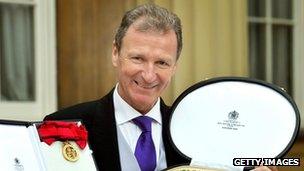UK faces enormous challenges, says top civil servant
- Published
- comments

Sir Gus was made a Knight Grand Cross of the Order of the Bath earlier this month
Politicians face "enormous challenges" on the economy, the EU and the future of the UK itself, Britain's outgoing top civil servant has warned.
Cabinet Secretary Sir Gus O'Donnell told the Daily Telegraph, external "whether to keep our kingdom united" would be one of the key issues.
Scotland's First Minister Alex Salmond welcomed the remarks and said UK parties had their heads "in the sand".
He has pledged a referendum within the SNP's four-year term in office.
In the article, Sir Gus, who steps down as cabinet secretary on 1 January, writes: "Over the next few years there will be enormous challenges, such as whether to keep our kingdom united and how to make the EU operate in the best interests of its citizens.
"But it is today's economy which poses arguably the biggest challenge."
'Buried in the sand'
Mr Salmond has said he will call a referendum on independence in the second half of the SNP's term at Holyrood but Prime Minister David Cameron has said he is committed to keeping the United Kingdom together.
BBC News Channel chief political correspondent Norman Smith said Sir Gus appeared to be signalling that the three biggest UK parties, the Conservatives, Lib Dems and Labour - who are all in favour of keeping the UK together, were not prepared to make the case for keeping the union.
Responding to the article Mr Salmond said: "Sir Gus is right to recognise the importance of the constitutional issue, and the SNP government are up for the challenge of building and winning the case for Scottish independence - unlike the Westminster parties, who seem to have their heads buried in the sand."
Speaking later on BBC Radio 4's PM, Sir Gus said: "I think if you're thinking about the list of challenges for the future, actually the challenge I would point to as the most important is the economy.
"But there is also, I think, an interesting question about having an honest and objective debate about the pros and cons of The Union."
'Cultural inertia'
In his Telegraph article, Sir Gus also said he was proud of the "thorough, evidence-based analysis" carried out under the previous Labour government - while he was permanent secretary at the Treasury - which informed the decision not to join the euro.
And he called on the civil service - of which he is the head - "to become a central part of [the economy's] recovery and growth".
"There is, of course, some cultural inertia to overcome, but there is a voracious appetite among departments to take on this challenge... We know we need to deliver better for less," he said.
The outgoing cabinet secretary also touches on the issue of red tape and bureaucracy, and suggests MPs are too quick to create new legislation and regulations to solve problems.
Of the 1,200 regulations that have been examined so far, civil servants have recommended scrapping over half of them.
Ministers and officials should be "prepared to take more risks" and "learn from failure", he adds.
Sir Gus became cabinet secretary in 2005 and when he steps down the post will be split into three.
Number 10 permanent secretary Jeremy Heywood will succeed him as cabinet secretary.
His role as head of the civil service will go to Bob Kerslake, currently permanent secretary of the Communities and Local Government Department, while the role of permanent secretary at the Cabinet Office will go to Ian Watmore, ex-chief executive of the Football Association.
- Published17 December 2011
- Published15 November 2011
- Published11 October 2011